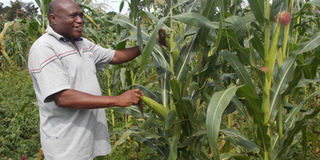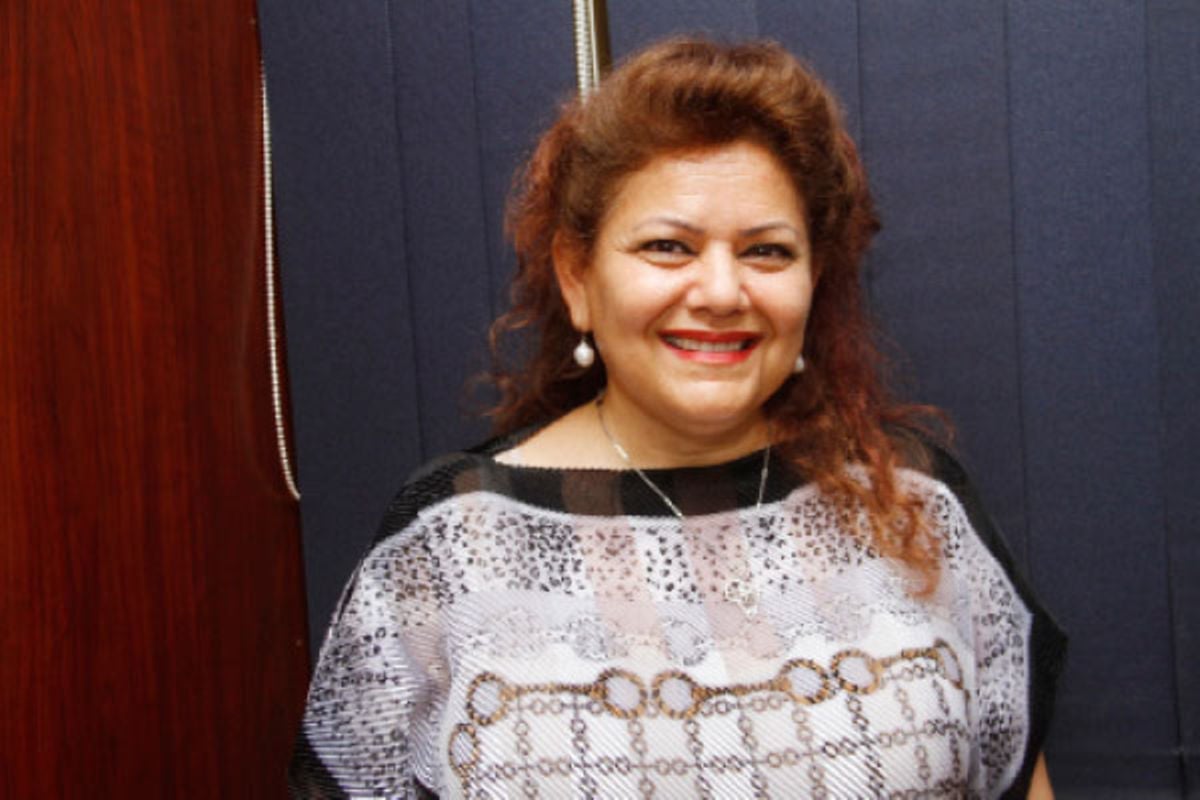Priest learns farming from his flock

Father Henry Kasule examines his maize crop. The priest has also planted banana and coffee on his 10 acre farm. PHOTOS BY MICHAEL J SSALI
What you need to know:
- Rev Fr Henry Kasule mainly applies organic manure on the banana plants, coffee, beans and maize to achieve the vigorous growth manifested everywhere on the entire 10 or so acres.
- He revealed that the planting materials and early supervision of the coffee gardens were actually provided by a church member, Mr Michael Kasumba who is also the treasurer of the parish council.
The Rev Fr Henry Kasule, 63, Parish Priest of Kyanukuzi Parish in Masaka Diocese, is a priest with a difference.
He does not only preach the gospel to his flock whose individual homes he has all visited but he also tries his best to generate income for the parish through farming.
He has told Seeds of Gold, “During the first eight months of my relocation to this parish, the main activity was making pastoral visits to the individual homes of the faithful. I came to discover that many of them are good farmers and it was an opportunity for me to copy some farming practices from them.”
Farming journey
He has been at Kyanukuzi for only two years having been transferred from Kitovu Cathedral Parish where he had been Parish Priest for more than 10 years. “Kyanukuzi Parish which was started less than 20 years ago is much younger than Kitovu where I had been and it has fewer resources in terms of income,” he narrated.
“When I arrived here I realised there was a lot of work to be done, yet there was very little money. The diocese does not send out money to parishes to pay bills for electricity, water, feeding the priests or paying workers’ salaries. Our Sunday collection and church dues were quite insufficient. Much as most people who come to church are willing to make donations they have big financial issues too. However, the parish had land on which we could do a number of income generating activities. I therefore decided that the best thing to do was to use that land to generate income for the parish.”
Before his arrival at Kyanukuzi, the parish council had already set up two flourishing clonal robusta coffee gardens ---- one about three acres and another about an acre.
Planting materials
He revealed that the planting materials and early supervision of the coffee gardens were actually provided by a church member, Mr Michael Kasumba who is also the treasurer of the parish council.
“That gentleman has been so supportive, always available and ready to give guidance especially in regard to coffee growing,” says Fr Kasule.
“I am also grateful to another member of the church, Mr Silas Kato of Manja Village who provided the banana suckers that were planted in the new parish banana garden. I did not have sufficient experience in farming myself but as a little child I had done a lot of work in the garden under my grandmother’s supervision. She was such a strict disciplinarian who always allocated us work to do in the garden and made sure it was accomplished to her satisfaction.”
Mixed farming
When Seeds of Gold visited about two weeks ago, Rev Fr Kasule had some 10 acres under cultivation planted with maize, clonal Robusta coffee and banana.
He is so determined that he has dug a pit at one end of the farm with the view to harvest rainwater for irrigation, in case of a prolonged drought.
“I had just planted the coffee that you see and I feared all the plantlets would dry up if I didn’t do some irrigation,” he said. “However, no sooner had the pit been dug than it began raining.”
He employs a few people since he cannot devote all his time to farming. As a priest he has to say Mass every day and to administer sacraments, apart from attending to the other duties of a parish priest.
“I would have covered more work on the farm but I spent my first eight months making pastoral visits to parishioners. It is part of our work of course but it provided me with an opportunity to learn more about farming and to see how much the people I preach to struggle to earn a living.”
He does much of the physical work himself but sometimes he does so together with fellow priests at the parish, like in the harvesting of coffee.
Determination
He also employs some people and when Seeds of Gold asked him how he raises the money for their wages he answered,
“I have friends who freely donate some money to help me do much of the work you are seeing. Some of the money is drawn from my personal savings. This is not really my own project and I keep a record of all expenditures under the hope that one day I will get back the personal money that I am investing in it if it turns out to be paying.”
Catholic priests can be transferred anytime from one parish to another by their diocesan bishop. Is Rev Fr Kasule not concerned that he can be asked to depart from Kyanukuzi even before the crops he has planted are ready for harvest?
“I am very much aware of that possibility but I don’t mind being transferred. I must obey the orders of my bishop and I am ready to leave even tomorrow if he so decides. I believe that the next Parish Priest and the Parish Council will take charge of the work that I have started.”
Agronomy
In some cases he has not had to pay for labour in cash. “I have struck a deal with some two hard working men from Kabale, in Southern Uganda. I have allowed them to grow some maize and beans on some of the land but we have agreed that I intercrop the gardens with coffee and banana. They harvest their crops and take them after which I remain with the banana and coffee trees. The men pay themselves with the maize and beans that they grow. I also use the left-over maize stalks as mulch in the banana plantation to prevent soil erosion, sustain soil moisture, and generally nourish the soil. In the first two years after planting, banana and coffee can safely be intercropped with such crops as beans, ground nuts and maize as long as they are not planted too close to the coffee and banana. ”
Manure
Father Kasule mainly applies organic manure on the banana plantains, coffee, beans and maize to achieve the vigorous growth manifested everywhere on the entire 10 or so acres.
He is also considering applying inorganic fertiliser in addition to organic fertilisers to maximize yields.
He grows three quite marketable banana varieties, Mpologoma, Kibuzi, and Gonja. True to the English saying –“The sole of the farmer’s boot is the best manure on the farm” --- Father Kasule believes in the importance of farm inspection and he regularly takes a walk in the farm to see if things are going well.
What others say
Mr Edward Kitayimbwa, a resident of Buyoga Village and a member of Kyanukuzi Parish Council, has said, “We are blessed to have Father Kasule as our Parish Priest. His farming projects will also be teaching projects for the ordinary people in our community. When people see the crops on the church farms they draw lessons and get to know how to fight poverty.”
Mr Michael Kasumba, treasurer, Kyanukuzi Parish Council, said, “His money generating innovation through farming will reduce the burden of settling bills and employees’ wages as well as running the day to day activities of the parish.”
Mr Ambrose Mbogga, leader of the laity, Kyanukuzi Parish said, “We used to regret the going of the previous Parish Priests but Father Kasule has been such a big consolation because of his farming efforts.
We know he is going to cause as much development here as he did at Kitovu Cathedral Parish. He wakes up very early every morning and, after his prayers, rashes to the farm. He identifies himself so well with the rest of us and he is bound to demonstrate to the local community the importance of farming.”




